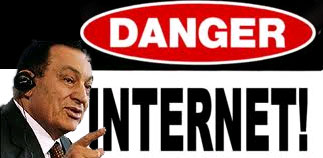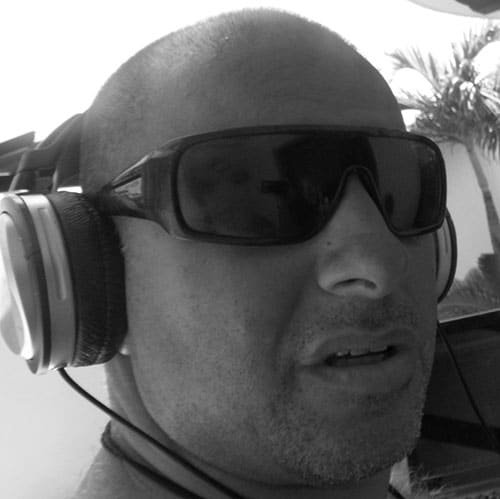Mubarek Attempts to Cut Off His People from the World
Will U.S President Obama Take Action and Demand Mubarek Open his Net Borders?
by Johnny Punish
![]() “The whole dam thing has been shut down!” screamed a mad-as-hell Egyptian in the massive protest crowd today! Large parts of the Internet essentially went dark about midnight Egypt time after the government of President Hosni Mubarak, a longtime ally of Washington, ordered service providers and cell phone companies to shut down. “Under Egyptian legislation, the authorities have the right to issue such an order and we are obliged to comply with it,” Vodafone, one of the largest cell phone carriers, in Egypt, said in a statement.
“The whole dam thing has been shut down!” screamed a mad-as-hell Egyptian in the massive protest crowd today! Large parts of the Internet essentially went dark about midnight Egypt time after the government of President Hosni Mubarak, a longtime ally of Washington, ordered service providers and cell phone companies to shut down. “Under Egyptian legislation, the authorities have the right to issue such an order and we are obliged to comply with it,” Vodafone, one of the largest cell phone carriers, in Egypt, said in a statement.
The oppressive Mubarkek has committed a cyber-mortal sin in trying to cut people off from what has become their personal cyber lives. Facebook and Twitter have become personal extensions of the 21st-century citizen. But Mubarak, being that he is over 80 years of age, does not seem to understand what century he’s living in and thus will pay the ultimate price for this cyber-sin. He’s done!
After all, this is about social networks that are beyond the reach of Mubarak and Mubarek doesn’t get it.
Attempts to get to pretty much any Web site in Egypt are unsuccessful, and Twitter.com is unavailable inside the country — protesters and sympathizers have been able to get their message out through a variety of means because “what the government does is very effective for stopping the most basic users, meaning average users, the folks who probably aren’t Twitter users,” says Philip N. Howard, director of the Project on Information Technology and Political Islam at the University of Washington and author of “The Digital Origins of Dictatorship and Democracy: Information Technology and Political Islam.”
“Most of the folks who are tweeting are kind of the digital elite who can set up proxy servers and Twitter clients and get their message out,” he says. “It only takes a few thousand of those folks to feed the rest of us news about what’s going on.”

Here’s the text of our full conversation with Howard:
Why would the government “shut off” the Internet?
It’s clear that in today’s digital media world, the best thing a dictator can do to manage a crisis is trying to shut off digital networks. Mobile phone networks and digital networks are what savvy students and civil society leaders use to spread their message. Sometimes that message is political; sometimes it’s coordinating the logistics — say, “today’s protests are at the corner of such and such.” That’s much easier now because of Facebook and Twitter.
It’s also a pretty blunt instrument. Dictators can tax newspapers or tax ink or shut off the power to TV or radio stations.
How would it go about cutting off access?
For mobile phone networks, the thing to do is shut off cell phone towers. Authoritarian regimes are usually slower and more clumsy than cell phone[-using] activists. So when you shut off cell phone towers, this has the effect of pushing traffic to other cell phone towers. This is what happened in Iran in 2009.
Cairo’s a global city, so there are a lot of people with international mobile phones and Skype connections, so shutting down the cell phone towers doesn’t always work well.
The second way is to shut down Internet exchange points. There’s going to be a couple of hotels that have good security and are air-conditioned [housing those exchanges], and the government would send in some folks to turn the power off. That doesn’t always go well, because if one node goes out, there are other nodes. For example, people are uploading videos to Israel through Europe. It slows down the traffic, but it doesn’t stop it.
What factors does the government have to balance in deciding whether the tactical advantage of cutting off access is worth the public relations damage of being seen as interfering with the Internet?
I don’t think the regime is worried about whether the nation’s computer users will be upset. I think they’re mostly worried about the communications between families and friends among the citizens of Cairo. Digital networks are ultimately social networks. The real threat to the regime is people will take pictures of the police beating their brothers and sisters, and the regime can’t respond well to Facebook images of the police shooting rubber bullets into a crowd — there is no regime response to those images that go out over trusted networks.
If this was simply the Muslim Brotherhood or some union leaders bringing out their members, that would require a different kind of strategy. This is about social networks that are beyond the reach of Mubarak.
What the government does is very effective for stopping the most basic users, meaning average users, the folks who probably aren’t Twitter users — this is the older generation. It’s not a very good strategy. Most of the folks who are tweeting are kind of the digital elite who can set up proxy servers and Twitter clients and get their message out.
It only takes a few thousand of those folks to feed the rest of us news about what’s going on. Definitely, around the American University of Cairo, there’s a pretty savvy student population. Next to Iran, Egypt has the largest blogging community in the region. The regime doesn’t seem to win the information war very well.
What do you think will happen when the country goes back online?
I think we’ll see a lot of documentary evidence about how tough the regime response has been over the last 24 hours. Just because the connections are down do not stop people from capturing what’s going on in the Cairo streets with their mobile phone cameras. Mubarak’s not going to be able to keep the Internet off for long because it will affect the economy.
In today’s connected, mobilized world, you can’t shut the Internet off for more than a few hours. Shutting the Internet off affects the security services and the economy, so it’s sort of a scattershot approach — the state hurts itself, too.
What are the ramifications for the larger region?
The wider question is what’s going to happen in Tunisia, Lebanon, and Algeria. These are other countries where digital networks have drawn out large networks of non-militant protesters. They’re just tired of authoritarianism by guys who have had 25 years of rule. This is really about throwing the bums out.
The entrepreneurs in Tunis, Cairo, and Beirut who just want to run a fruit cart of their own can’t run their basic business. There’s more of fighting for their livelihood.
For the U.S., they’re dictators, but they’re on our side, so I think the State Department is struggling between whether to support a popular uprising or whether to support a strongman who’s been on our side for 25, 30 years.
The question for us Americans is will our President Obama cut off all aid to a dictator who cuts his own people off from freedom or will President Obama look the other way as previous U.S. Presidents have in order to preserve what they perceive is the greater regional good for U.S. interests? If President Obama does NOT take action to punish, then are we Americans at the same level of risk as the Egyptians? This uprising is about us too is it not? A net is a serious place for all of us now and cutting any of us off from it would be a major crime against humanity. This is the 21st-century global freedom war front and it’s us versus them. Who’s going to win?
©2011 copyright – JohnnyPunish.com

Johnny Punish founded VT in 2004. After 20 years at the helm, he “retired” from the daily operations in late 2023 passing the ball over to the new owner of VT, Chief Justin Time. He now writes for VT as “Writer Emeritus”. He is also a global citizen eco-activist, visionary, musician, artist, entertainer, businessman, investor, life coach, podcast host, and syndicated columnist.
Punish is an ethnically cleansed Palestinian-American whose maternal family was evicted from their home in Haifa, Palestine in 1948 by Irgun; a Euro-Zionist Settler Terrorist Group. The family became part of the over 1,000,000 Palestinians who are Al-Nakba refugees (The Catastrophe). The family fled to Beirut Lebanon for 13 years eventually emigrating to the USA in 1961 via a Brasilian passport obtained by his Palestinian Brasilian-born grandmother (In the early 1900s, the family was sent to Sao Paolo Brasil as guest workers in the mining industry. Punish’s father is Italian-American from New York City. Punish’s paternal great-grandparents emigrated to the USA from Naples Italy and Marineo in Sicily in the 1890s. Punish was born in the Bronx, New York in 1963.
Punish was educated at the University of Nevada Las Vegas (1980-81) and California State University Fullerton (1981-1984) with studies in accounting and business. Before the “internets” had been invented, he owned and ran (5) national newspapers in the United States of America from 1987-1998. From 2004 to 2023, he owned and managed VT Foreign Policy retiring at the end of 2023.
Punish is also a recording artist. He has over 100 original songs written. He records and produces music. A member of ASCAP, Punish has several songs placed in feature films. His music is promoted worldwide and played on all digital networks and net radio.
He is also the founder and owner of Global Thinkers, a freedom media that helps free thinkers create real wealth.
Resources: Facebook – YouTube – Apple Music – SoundCloud – Spotify – X (Twitter)
Read Johnny’s Full Bio at JohnnyPunish.com >>>
ATTENTION READERS
We See The World From All Sides and Want YOU To Be Fully InformedIn fact, intentional disinformation is a disgraceful scourge in media today. So to assuage any possible errant incorrect information posted herein, we strongly encourage you to seek corroboration from other non-VT sources before forming an educated opinion.
About VT - Policies & Disclosures - Comment Policy



